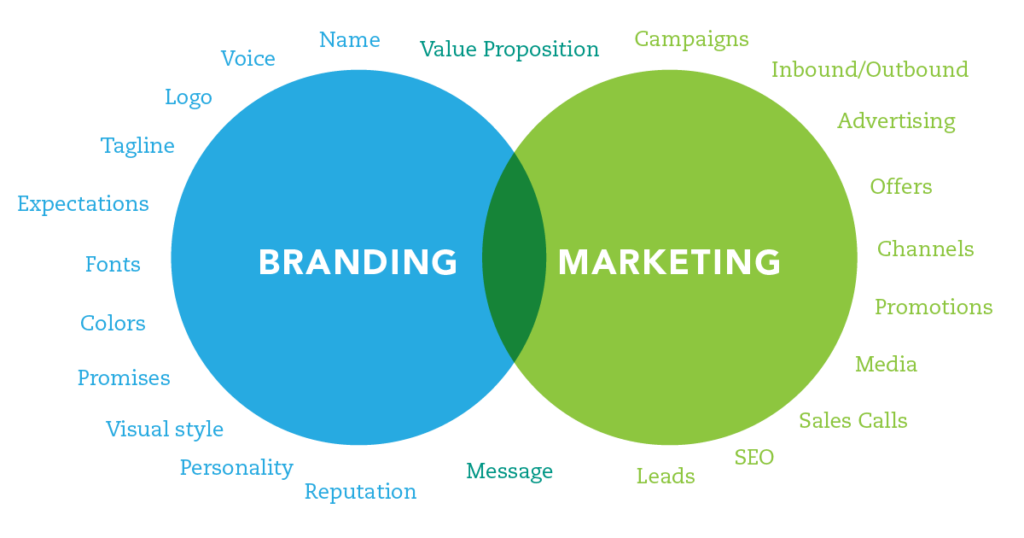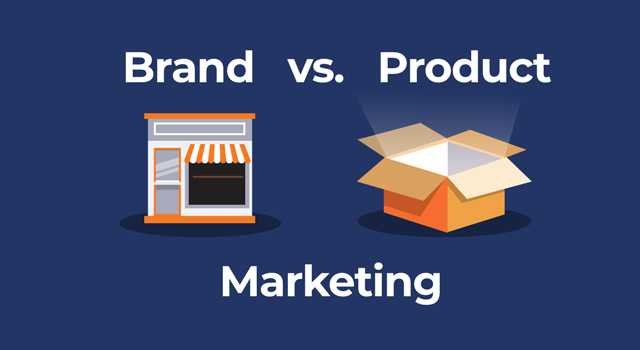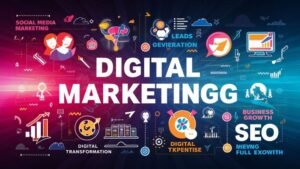In today’s competitive business, most companies are looking for a digital marketing agency in India to get them noticed, connect with potential customers, and expand their brands. But those who do not know much may be surprised at what is the difference between marketing and branding, imagining that they are the same concepts. Although each is a step towards success in a company, the two serve different functions. Thus, in this article, we will focus on some of the most notable distinctions between promotion and marketing as well as their roles, and cover issues such as whether it is possible to include branding in digital marketing, which is harder – brand managers or digital marketer and if it’s possible to turn from a digital marketer into a brand manager.
What is the Difference Between Marketing and Branding?

Without addressing the latter first, there is the matter of the understanding of the distinction between marketing and branding. It is worth stating that they are all aimed at the advancement of the business but performing different tasks.
- Marketing is defined as the activity of communicating a product/service/business to an intended audience and is compensated for that. Its key aim is to create awareness, attract customers, and make sales. Because marketing is an ever-evolving field, it embraces short-term plans that are geared towards achieving specific goals, for example, marketing a new product, boosting sales during festive seasons, or increasing sales leads. It incorporates several approaches like content marketing, search engine optimization (SEO), pay-per-click advertisements, e-mail marketing, and social media marketing.
- In this case, however, branding most of all is about stating who the business is. It is the process of distinguishing oneself and connecting with people on a deeper level. It emphasizes investment such that long after a decision has been made to leave the organization; efforts are made to alter or rather sustain the thoughts of that company. Some factors that fall under branding are the name of the organization, the design logo, the claim of the business, the style, the principles, and the mission of the company. Branding helps such a firm to answer: Who are we? What do we stand for? Why would any customer believe and trust our organization? Simply put – marketing is branding communication designed to bring in customers to a company, whereas branding has an emphasis on fostering customer satisfaction for life through trust, loyalty, and recognition based on the unique attributes of a brand.
Is branding a digital marketing?

Lots of people think that branding and digital marketing are related concepts and, therefore, should be handled the same way. In this regard, branding is not simply one component of digital marketing, but rather a concept that covers all types of marketing, and digital marketing is just one approach.
Branding now focuses on enhancing the brand with online facilities to capture a wider market. Branding forms the base of which other components of digital marketing are contained, in this case, the digital marketing strategy. Hence, when executed effectively, DMA works in tandem and reinforces the brand image, voice, and message on various relevant platforms. This is how branding integrates with digital marketing:
- Uniformity: Branding makes it possible for digital marketing campaigns through Social Networking Sites (SNS), Email, and Content on the website to convey a uniform tone, message, and image.
- Brand Recovery: It is less difficult for specific audiences to understand a campaign when its initiatives come from a well-conceived marketing campaign brand, thus hastening brand awareness and greater responses.
- Use: Branding fosters strong emotional bonds with customers making them more receptive to any marketing initiatives as they can resonate with the ideals of the brand and have a stake in it.
One face that explains the differences in the perception of advertising and branding is that while it is possible to convey a message through the means of digital marketing with the expectation of immediate action, it remains the precise ad that would lead to the transformation of the buyer into a permanent advocate. Branding is a de facto requirement irrespective of the fact that it has no direct relations with digital marketing as an activity. This is so because branding has a role to play in relieving the strategic burden on marketing activities.
What is the difference between a brand manager and a digital marketer?

In an organization, a brand manager and digital marketer are said to be interdependent, however, there is a striking difference in terms of their areas of concentration and scope of work.
- Brand Manager: The brand manager oversees building the corporate brand. This includes developing products and services such that they embody what the company stands for, and what customers want. Managers tend to look more at the brand’s potential future development rather than its present status – projecting uniformity of communications and customer loyalty. Brand managers manage brand attributes (i.e. logo, tagline, colors, related to the brand, brand, and audience association), strategy (planning regarding where to position the brand in customers’ minds and what messages to use), and consumer-brand relations (emotional) associated with the brand. They collaborate with marketing departments to avoid misperceptions of the campaign’s brand positioning, but they are not involved in campaign management on a day-to-day basis.
- Digital Marketer: In contrast, a digital marketer emphasizes the use of specific marketing weapons that are aimed at building the company or its offerings over the electronic medium. This position involves carrying out search engine optimization campaigns, pay-per-click advertising campaigns, social media posting, email marketing campaigns, and analytical campaigns. A digital marketer’s objective is visibility enhancement, site traffic increment, and higher conversion rates.
To sum up, brand managers adopt a more macro perspective over the branding process and activities of the brand looking at it through the long-term lens whilst digital brand managers carry out defined actions resulting in particular results. There are no two ways about it, both are important in that they collaborate and make sure that the brand is developing the right way and at the same time targets the short-term marketing objectives.
Can a Digital Marketer Become a Brand Manager?

Yes, a digital marketer has the potential to work in brand management however this will come with a perspective adjustment and relocation of the respective skill set. A well-rounded knowledge of what works for an audience and engaging them provides a robust background for a brand manager out of a digital marketer. Nevertheless, a digital marketer should not remain with that slide mentality, instead, they must learn to be more strategic regarding the development, positioning, and retention of the brand.
To elevate their careers into brand managers, they should acquire the following key skills relevant to digital marketing:
- Strategic Thinking: It requires that the brand manager not only doesn’t look at the short-term numbers but also considers the brand value over the years. Such as how to analyze trends in the market, consumer behavior and perceptions, and competitive positioning.
- Creative Vision: Depending upon the maturity and orientation of the brand, brand managers may interact with creative departments to build communication in a way the brand requires. An advisable brand manager knows how to manage the creative assets of the brand to get the value and the personality of the brand across.
- Cross-Functional Collaboration: Whereas in the case of digital marketers, one or two departments focused, usually sales or tech are collaborating with the digital marketing function, brand managers work more in the borders since there is the customer’s product, PR, and the customer care departments that all relate to the brand.
- Recognizing this trend, some companies are seeking employees who are optimally versed in both tactical marketing as well as strategic brand management to head their brand initiatives.
What is the Difference Between Product Marketing and Branding?

Although there is confusion regarding the two concepts, product marketing and branding are often used to refer to the same function, their implementation differs in concentration and practice.
- Product at Marketing: This is concentrating on a product or a service and marketing it in a way to make sales. It includes e.g. defining the product’s competitive advantage, finding out who the audience is, and creating strategies that show the advantages of the product. Product marketing is more of short-term concaving product strategies to sell more products and to increase market share.
- Branding: Branding works on a very wide landscape and is very far-sighted in its perception and effects. It does not emphasize individual items. Rather it concentrates on how the company is perceived and the values it holds. Branding strives to meet the objectives of all the products and services that the company has without violating the mission of the company and tapping into the affective side of customers. Strong brands are supportive of a favourable business climate for several products. For example, although Apple integrates product marketing strategy in the selling of products for instance iPhone, the company’s branding strategy revolves around several core values such as simplicity, innovation, and luxury appeal in all their products.
Conclusion
Knowing the distinction between digital marketing and branding should be of utmost importance to businesses in the long run. Normally, an Indian digital marketing agency in India can implement selected activities to create engagement or establish sales, however, branding makes sure that those activities are in congruency with the company’s vision. The two are complementary such that a complete scope of the solution is in place where marketing spurs action and branding creates retention.
The other side of the coin is that since digital marketers progress in their careers, they certainly would want to pursue brand management since they already understand how consumers behave and how to engage them. However, in the year 2024, companies will be successful if they embrace product selling and product image to achieve consumer retention.
Furthermore, given the opportunity to use tools such as ChatGPT, companies can make better use of digital marketing strategies while keeping to their brand and delivering on consumer expectations across several communication mediums.





